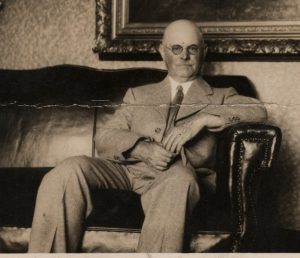My great grandfather, George Gilbert Uren (later Wren), was born in Falmouth in 1862, and died in Bournemouth in 1954. I don’t know much about him as a child, but it is clear that he spent time in the Scilly Islands, as he married a local girl, Ethel Edwards.
 I assume that he had a decent education due to his family’s position, but the first actual fact that I know about him was that he studied with Andrew Jamieson, at the University of Glasgow. His “degree”, actually a letter of reference, states that he studied what we would call Electrical Engineering, and also assisted in the preparation of a Pocketbook of Electrical Rules and Tables for the use of Electricians and Engineers” which was published in 1894, and is still available as a Google book. I can just imagine him as a young graduate student doing some of the thousands of calculations it took to populate the book.
I assume that he had a decent education due to his family’s position, but the first actual fact that I know about him was that he studied with Andrew Jamieson, at the University of Glasgow. His “degree”, actually a letter of reference, states that he studied what we would call Electrical Engineering, and also assisted in the preparation of a Pocketbook of Electrical Rules and Tables for the use of Electricians and Engineers” which was published in 1894, and is still available as a Google book. I can just imagine him as a young graduate student doing some of the thousands of calculations it took to populate the book.
I would love to know how young GG pursued this path. It can’t be a coincidence that his father JG had been active in telegraphy, and that his brother Charles (he of the Siberian saga) worked for the same company that later employed GG, or that his grandfather had worked for the Packet Service.
The timing of his engineering training is a little strange. He married Ethel Edwards in Scilly in 1886, and my grandfather Jack was born in Shanghai in 1889. The degree is dated 1891, which only works if GG came back to Scotland to study. In any case, by tracing through the history of various telegraph cable layers in the Far East, I can infer that he worked for the Eastern Extension Company, which later was incorporated into what eventually became the Cable and Wireless Company. If this is correct, then during the time he was employed, he could have assisted in the following cables – “Shanghai to Guam, via, Yap, with branches extending, to the Dutch Indies and German New Guinea and other islands in the Pacific Ocean”. It is also interesting to note that he would then have been the third generation to have spent time working on ships – John as a sailor, JG as a telegraph inspector for the Post Office, and now GG as an inspector.
Ethel Edwards died in Shanghai, and at some point GG moved from Shanghai to Batavia in the Dutch East Indies. Here in 1896 he met and married a Dutch colonial woman named Antoinette Beins. They had two sons, Bernard and George, the two young boys in the picture at the top. The circumstances of GG’s return to England are a bit mysterious. Family lore has it that he was diagnosed with a fatal disease and sent back to England with a pension that was to last until he died. Inconveniently for the Eastern Extension Company (by then called Eastern Extension, Australasia & China Telegraph Company), he did not die, but lived on until 1954.
Most of what I know about him after returning to England is apocryphal. At some point, his second wife was hospitalized for mental issues. GG removed to Bournemouth, where he maintained a house with a housekeeper (reputedly with privileges), and seems also to have had some sort of connection to mining interests back in Indonesia. On one of his trips he came through the US, and visited his son John Gilbert (Jack, my grandfather), as well as brothers Bernie and George, in Chicago. My mother told a story of his meeting some of her friends in Chicago. Unfortunately they were of Irish extraction, and, true to his generation of Brits, he spat at their feet and walked off.
Before moving on to his sons, and particularly my grandfather, I just want to stop and savor the progression of these three sons of the Empire, from common sailor on Royal Navy sailing ships serving abroad, to senior functionary in the Royal Postal Service, serving some years abroad, and then to technical work for a company helping to build the Empire, again abroad. Combined with the family’s social advancement, this history seems so characteristic of a certain class of English folks, the sort that Orwell wrote about in Burmese Days. When I get to the Blackwells (and I promise I will!) I see the same sort of trajectory, but this time from colonial to frontier to early modern America.
